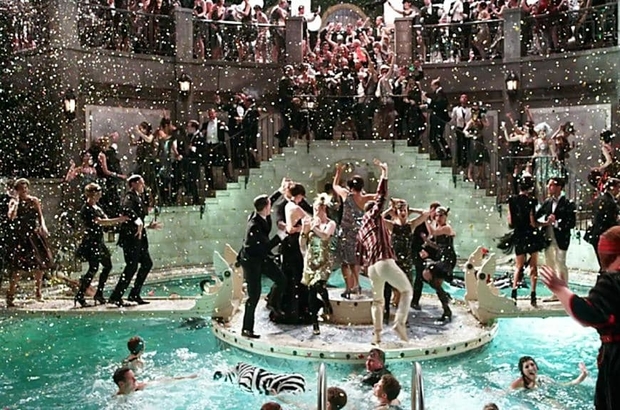JASPER NEWPORT explores the decadent party age of the 1920s and its moral implications in Fitzgerald’s literature.
The Great Gatsby, perhaps the finest work of F. Scott Fitzgerald, encapsulates the Jazz Age. Immersing the reader in the extreme highs and lows of the time, the novel explores the doomed, tragic-heroic figure of Jay Gatsby as he seeks the love of his past in the decadent world that surrounds him. His story is a reflection of the context that inspired it; America is immersed in the gaudy, outrageous excess of 1922, visible in the rich imagery that catapulted Fitzgerald into literary fame. By examining the chaos of Gatsby’s parties, the extent of the cruel and corruptive wealth of this period is exposed. Readers feel the guilt and damage that decadence exacted on Americans, and understand Gatsby’s futile attempt to be a quiet, noble alternative to these extravagances.
Let’s consider the significance of the now famous Gatsby party. Post-1918, the rich youth of the East Coast revolutionised their social scene. For this young wartime generation, opulent parties were an open indulgence for the first time, a rejection of the pre-war social order. Considering this, Gatsby’s parties elegantly express the emerging anti-Prohibition culture of the 1920s; by using them as a stage for his narrative, characters, and ideals, Fitzgerald taps into an idea that resonated with his America.
Considering the mastery with which he uses this motif, it is unsurprising that Fitzgerald’s main inspirations were not fellow authors but poets, such as John Keats. His writing is often more poetical than prosaic, particularly in its use of soundscape imagery, which is essential in The Great Gatsby. Fitzgerald’s lyrical style of writing helps build a portrait of the age, and nowhere is this more evident than in the flush and excitement of the party. Our narrator Nick observes that it transforms a scene into something ‘elemental and profound’, despite the fact that the over-indulgence evident in these scenes is in fact quite the opposite.
Gatsby’s parties are chaotic and they subvert the audience’s expectation of harmless fun by revealing their excessiveness. Fitzgerald’s use of musicality and volume show this; in one scene the narrator lists a whole orchestra as ‘a pitful of oboes and trombones and saxophones and vials and cornets and piccolos, and low and high drums’. We are struck by the powerful uproar this evokes, exacerbated by the seeping of this musical imagery into the rest of the party, with the ‘opera of voices’ and a rough laugh depicted as ‘the boom of a bass drum’. This metaphor of classical instruments reveals the hyperbolic cacophony of the party that Gatsby hosts, its extravagance drowning out all discussion and conversation. Fitzgerald’s subtle lexical choices in these sections create an atmosphere of toxicity, artificiality and suffocation. This is seen in the image of the moon as ‘surviving the laughter and sound’ – the choice of ‘surviving’ colouring the audio world with the idea that such excess can be as threatening and damaging as it is exciting and glamorous.
The titular character’s place amid the noise provides a striking juxtaposition within the scene. Gatsby stands alone, meditative and silent with ‘no singing quartet perform[ing] with [him]’, despite the party raging around him. From this moment on, it is evident that he represents something quite different from his guests: he is a character not tempted by the indulgence of his own party, starkly alone amidst the chaos he encourages by hosting it, the one figure who is not lost in the lurid orchestra. What is Fitzgerald trying to communicate here? Surely, another veiled critique of the Jazz Age’s hedonism must be drawn from the lone host, suggesting even the most lavish indulgences do not bring true satisfaction. Gatsby’s silence gives him a jarring, ghostly sense of removal from those around him. Moments like this make Gatsby’s eventual death at the hands of wealthy rivals all the more significant and we begin to see Fitzgerald’s pessimistic belief that even an individual as apparently great as Gatsby is not immune to the money-fuelled vulgarity of his age.
Eventually, Gatsby’s seemingly stoic refusal to conform becomes his undoing, and the fact that this path is begun by such subtle, sensitive use of language is testament to the author’s mastery. Gatsby may think he has not succumbed to the cacophony and extravagance of his age, but he is intrinsically part of it by hosting the parties himself. His eventual demise is therefore unsurprising as no one is shown to be completely immune to the era’s corruption. Fitzgerald commented, referring to his own generation, that ‘they were living on borrowed time anyway’ – judging ‘them’ but not including himself in this. He attempts to remove himself from his own generation, just as Gatsby tries and fails to do, and perhaps we should judge both Fitzgerald and his protagonist for their attempts at moral detachment from their own era.
Featured image source: www.dailytelegraph.com





